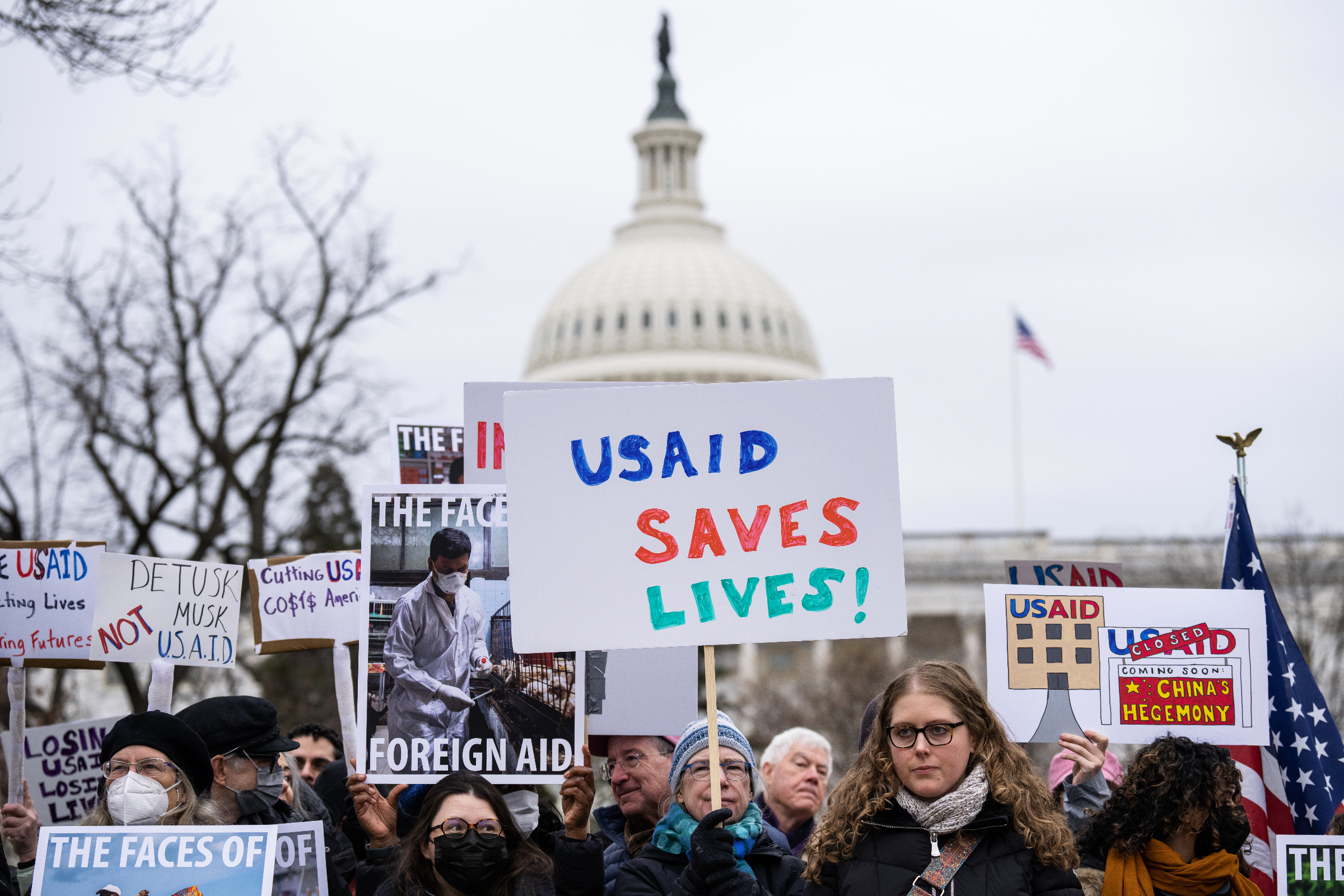Share post now
Analysis of the demise of USAID
Development cooperation is of systemic importance
17.02.2025, International cooperation
Much has been written in recent days about the dramatic dismantling of the American development agency USAID. It is now clear that not only was the agency destroyed in an undemocratic and unlawful manner, but that moreover, the decision is having worldwide repercussions. Despite its much-vaunted humanitarian tradition and advocacy of multilateralism through international Geneva, official Switzerland is still noticeably silent.

Protesters call on US Congress to rescue USAID. © KEYSTONE / CQ Roll Call / Newscom / Tom Williams
The US development agency USAID was founded in 1961 by John F. Kennedy. It has since grown into the world's largest development agency. With an annual budget of USD 40 billion (less than 1% of US government spending), it accounts for roughly 40% of total official development spending by all countries in the Organisation for Economic Cooperation and Development (OECD). Now, in a few short weeks, it has been completely incapacitated. Elon Musk – the world's richest man with no official mandate now at the helm of Donald Trump’s Department of Government Efficiency (DOGE) – is leading the charge against USAID. In a series of hate-filled tweets, he called the development agency a "ball of worms", "a viper's nest" or a "criminal organisation", and said it was time for it to die. It is understood that shortly thereafter he ordered the sending of an email to all employees requesting them to stay at home. Then came one blow after another. Senior managers were dismissed or sent on leave. Suddenly, the USAID website, its X account and staff email accounts were no longer accessible. Besides, Musk obtained unlawful access to sensitive agency data when a group of young IT specialists (the so-called "DOGE kids") defied the instructions of the security staff and aggressively made their way into the offices of the US agency. In the same manner, the DOGE kids procured sensitive data from the departments of health, education and finance. Senator Chuck Schumer described the group as "an unelected shadow government ... conducting a hostile takeover of the federal government”.
Although the development programmes were officially paused for just 90 days, and "life-saving humanitarian programs" could apply for special waivers, the actions of Trump and Musk give every indication that the USAID is unlikely ever to be resuscitated. Consequently, a number of partner organisations have announced that they would be unable to continue the programmes despite their special waivers, as Musk's DOGE kids have paralysed the organisation's entire payment system. In addition, Trump has meanwhile issued a new government decree ordering the agency to cease granting further waivers. Cynically, only military aid to Israel and Egypt continues unchanged. In the meantime, all employees have been instructed to return home to the USA, the "USAID" letterhead has been removed from the New York office, and official communications now refer to the agency as the "former USAID". In just a few weeks, an agency that was created by the American Congress, and whose budget is approved annually by Congress, was fed "into the wood chipper" by an unelected government representative (to use Musk's own words). Although numerous lawsuits have now been filed in the USA against the actions of Trump and Musk, it is not clear whether these will have any real impact, because, on the one hand, much of the judiciary is dominated by Republicans, and on the other, statements by President Trump and his Vice-President Vance suggest that any court rulings intended to curtail Trump's executive power will be ignored.
Devastating worldwide consequences
The shutdown of USAID is catastrophic not just from the standpoint of democracy, but it is also having serious repercussions around the world. Because the USAID conducts numerous projects jointly with other organisations, the international development system as a whole is being severely undermined. In addition to some 10 000 USAID employees who lost their jobs more or less overnight, thousands of jobs have already been slashed also in partner organisations that implement projects for USAID. Estimates are that more than 50,000 jobs have already been lost and that this number will climb to over 100,000 in the months ahead. Various Swiss NGOs, too, will have to lay off several hundred local employees. Many smaller partner organisations in countries of the South have already ceased operating altogether.
It is no exaggeration to state that the shutdown of the USAID holds life-threatening implications for millions of people. One example is the realm of healthcare, where USAID plays a pioneering role: its disappearance means that millions of people will now no longer be receiving vital medicines. The African Health Agency Africa CDC anticipates that there will be two to four million deaths per year as a result.
The abrupt closure of the USAID has meant, among other things, that tonnes of food are now rotting in warehouses as hundreds of thousands of children await their school meals, or that 11.7 million girls and women have no access to contraceptives. This considerably heightens the risk of unwanted pregnancies and childbirth complications.
Independent media coverage, too, will be severely impacted in many countries. In the year 2023, for example, USAID funded training and support for 6200 journalists, assisted 707 non-governmental news broadcasters and 279 civil society organisations that work to strengthen independent media in more than 30 countries, including Iran, Afghanistan and Russia.
Growing security risks
Clearly, neither Trump nor Musk cares about the demise of many NGOs in the Global South. In this country, too, some opponents of development cooperation are already rejoicing and wishing to see the Swiss Agency for Development and Cooperation eliminated. But the abrupt closure of USAID also harbours serious medium-to-long-term security risks – indeed globally.
USAID, for example, is largely responsible for monitoring and containing the Ebola virus in West Africa and also for the surveillance of avian flu in 48 countries. Combined with the withdrawal of the USA from the World Health Organisation, this shutdown has lethal implications and the risk of a global pandemic is growing.
The discontinuation of vital emergency relief in war-torn and crisis regions can also quickly lead to new waves of migration. Various experts are already warning that the vacuum left by the dismantling of USAID will benefit countries like China and Russia, which will now gladly step into the breach with the usual anti-Western rhetoric.
Crisis as opportunity?
The dismantling of USAID comes as the worldwide climate crisis worsens and the attainment of the Sustainable Development Goals (SDGs) proves ever more elusive. The OECD now estimates the funding shortfall for attaining the SDGs by 2030 at USD 6.4 trillion. In parallel, several European countries, including Switzerland, have cut development spending in recent years, and the international climate finance gap is growing steadily wider.
A rising number of countries are currently entrenching themselves behind their own national interests, and far-right propaganda seems to have regained social acceptability in many places. Besides affecting critical accomplishments in the areas of diversity, gender justice and the fight against racism, this is also strongly impacting development cooperation.
The global development system is certainly in need of reform – local players, for example, must have a greater role in designing and implementing projects. An open discussion on the future of development cooperation is to be welcomed. What has befallen USAID, however, is the exact opposite. The radical policies of Trump and Musk clearly demonstrate not just the massive worldwide repercussions of the abrupt elimination of a development agency, but also how quickly a democracy can be damaged and extreme right-wing ideology and rhetoric can take hold.
It now seems all the more important for countries like Switzerland, which are happy to brag about their democracy and their humanitarian values, to take a clear stand and strongly condemn the dismantling of USAID. Moreover, as host to an international cooperation hub in the form of international Geneva, Switzerland should now make common cause with other donor countries to financially cushion the loss of USAID and position itself over the long term as a defender of multilateralism and democracy. This is the only way that the crisis into which Trump and his acolytes seem to be plunging the entire world could yet perhaps represent an opportunity.
